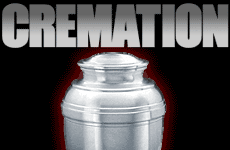 Iran’s Attack on Israel
Iran’s Attack on Israel


4 min read
Death involves not just the body, but also the soul.
With today's high cost of burial – casket, tombstone, plot of land – many are opting for cremation. What is the Jewish position?
Judaism permits only burial. The source for this comes from the Torah, where God tells Adam: “You will return to the ground, for it was from the ground that you were taken.” (Genesis 3:19)
This is reiterated in Deuteronomy 21:23 which insists on burial directly into the ground. By preventing a burial from taking place, one negates this mitzvah.
The body is more than just a physical shell.
The body is to be treated with great respect because it is through the vessel of the physical body that we have fulfilled our mission in life. The body is thus more than just a physical shell; it is a holy instrument.
A Jewish burial honors the body and treats it with respect. The body is watched over and lovingly cleaned. It is placed in simple white shrouds, and then in a coffin of wood.
Cremation, on the other hand, is destructive and denigrating. In the same way we don’t burn holy books, so too the body was a vehicle for the soul and should be treated with gentle respect.
Body and Soul
Upon death, the soul goes through a painful separation from the body, which until now had housed the soul. This process of disengagement occurs as the body decays. Burial allows the soul the time to slowly depart the body and to become accustomed to its new heavenly abode.
This decay is crucial, which is why Jewish law forbids embalming or burial in a mausoleum, which would delay the decaying process.
Jewish law dictates that burial take place as soon as possible after death. (In Israel, funerals often take place on the same day as the death.) Also, Jews are buried in a wooden casket, which decays more rapidly. All this is for the benefit of the soul.
One reason that Judaism prohibits cremation is that the soul would suffer great shock due to an unnaturally sudden disengagement from the body. As the Talmud says, “Burial is not for the sake of the living, but rather for the dead.” (Sanhedrin 47a)
Biblical examples of death by burning are considered examples of disgrace or tragedy (see Genesis 38:24; Leviticus 20:14, 21:9; Joshua 7:15, 25).
After the Holocaust it is imponderable that a Jew could agree to be cremated.
People think that cremation is antiseptic and wholesome. “One moment a body, the next moment a sealed urn of fine ashes.” The reality of cremation is more accurately described as a carcass roasting in fire. (Think of the smell when you leave something too long in the oven.) It takes about two hours to roast a human body at 1700 degrees Fahrenheit. And then comes the grinder to make sure that the bones which were not reduced to ashes will fit into the urn. Brooms are then used to sweep out the ashes. (These brooms are not always cleaned well, so different people's ashes are sometimes mixed together. Crematoriums actually have a disclaimer to this fact.)
After the Holocaust it is imponderable that a Jew could agree to be cremated.
What about the millions of Jews cremated in Nazi ovens? The Almighty certainly guarded their souls from needless agony.
Resurrection
Jewish tradition records that with burial, a single bone in the back of the neck never decays. It is from this bone – the luz bone – that the human body will be rebuilt in the future Messianic era when the souls of the departed will be reunited with their bodies.
The idea of resurrection is a fundamental belief of Judaism, as expressed in Maimonides' classical "13 Principles of Faith."
With cremation, that bone can be destroyed, and the resurrection process stymied. Thus the Talmud states that one who chooses cremation will not merit the resurrection.
These are very deep spiritual matters, and it is unwise to get swept away in trends. Although some may not believe in these Jewish traditions, burial is an insurance policy against mistaken belief. This is one decision which can have eternal consequences.
Sources:
